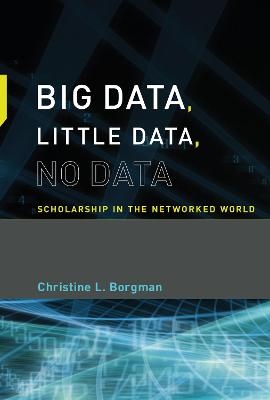
Big Data, Little Data, No Data
Scholarship in the Networked World
Seiten
2017
MIT Press (Verlag)
978-0-262-52991-4 (ISBN)
MIT Press (Verlag)
978-0-262-52991-4 (ISBN)
An examination of the uses of data within a changing knowledge infrastructure, offering analysis and case studies from the sciences, social sciences, and humanities.
"Big Data" is on the covers of Science, Nature, the Economist, and Wired magazines, on the front pages of the Wall Street Journal and the New York Times. But despite the media hyperbole, as Christine Borgman points out in this examination of data and scholarly research, having the right data is usually better than having more data; little data can be just as valuable as big data. In many cases, there are no data-because relevant data don't exist, cannot be found, or are not available. Moreover, data sharing is difficult, incentives to do so are minimal, and data practices vary widely across disciplines.
Borgman, an often-cited authority on scholarly communication, argues that data have no value or meaning in isolation; they exist within a knowledge infrastructure-an ecology of people, practices, technologies, institutions, material objects, and relationships. After laying out the premises of her investigation-six "provocations" meant to inspire discussion about the uses of data in scholarship-Borgman offers case studies of data practices in the sciences, the social sciences, and the humanities, and then considers the implications of her findings for scholarly practice and research policy. To manage and exploit data over the long term, Borgman argues, requires massive investment in knowledge infrastructures; at stake is the future of scholarship.
"Big Data" is on the covers of Science, Nature, the Economist, and Wired magazines, on the front pages of the Wall Street Journal and the New York Times. But despite the media hyperbole, as Christine Borgman points out in this examination of data and scholarly research, having the right data is usually better than having more data; little data can be just as valuable as big data. In many cases, there are no data-because relevant data don't exist, cannot be found, or are not available. Moreover, data sharing is difficult, incentives to do so are minimal, and data practices vary widely across disciplines.
Borgman, an often-cited authority on scholarly communication, argues that data have no value or meaning in isolation; they exist within a knowledge infrastructure-an ecology of people, practices, technologies, institutions, material objects, and relationships. After laying out the premises of her investigation-six "provocations" meant to inspire discussion about the uses of data in scholarship-Borgman offers case studies of data practices in the sciences, the social sciences, and the humanities, and then considers the implications of her findings for scholarly practice and research policy. To manage and exploit data over the long term, Borgman argues, requires massive investment in knowledge infrastructures; at stake is the future of scholarship.
Christine L. Borgman is Professor and Presidential Chair in Information Studies at the University of California, Los Angeles. She is the author of From Gutenberg to the Global Information Infrastructure and Scholarship in the Digital Age (both winners of the "Best Information Science Book" award from ASIS&T), published by the MIT Press.
| Erscheinungsdatum | 22.09.2016 |
|---|---|
| Reihe/Serie | The MIT Press |
| Zusatzinfo | 7 figures; 7 Illustrations |
| Verlagsort | Cambridge, Mass. |
| Sprache | englisch |
| Maße | 152 x 229 mm |
| Themenwelt | Informatik ► Datenbanken ► Data Warehouse / Data Mining |
| Informatik ► Theorie / Studium ► Kryptologie | |
| Naturwissenschaften | |
| ISBN-10 | 0-262-52991-2 / 0262529912 |
| ISBN-13 | 978-0-262-52991-4 / 9780262529914 |
| Zustand | Neuware |
| Informationen gemäß Produktsicherheitsverordnung (GPSR) | |
| Haben Sie eine Frage zum Produkt? |
Mehr entdecken
aus dem Bereich
aus dem Bereich
Auswertung von Daten mit pandas, NumPy und IPython
Buch | Softcover (2023)
O'Reilly (Verlag)
44,90 €
Datenanalyse für Künstliche Intelligenz
Buch | Softcover (2024)
De Gruyter Oldenbourg (Verlag)
74,95 €


